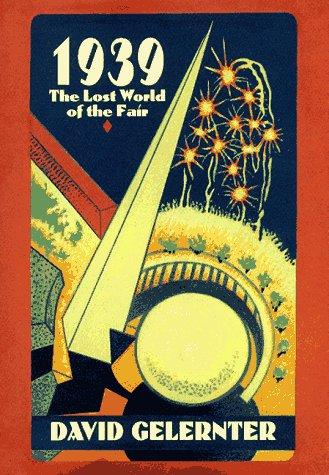Summer Reads: Epstein on 1939: The Lost World Of The Fair

FrumForum correspondents and readers are encouraged to blog about the books they are reading this August. Please send any entries to editor[at]frumforum.com with the subject line, “Summer Reads.”
1939 was not a happy time. The Great Depression had just shuddered into its tenth year, and U.S. unemployment rate stood at 17.2%. Hitler leered from Europe, where he had just annexed Austria and Czechoslovakia. Imperial Japan’s bloody march through Asia continued apace.
And yet --1939 was also the year that saw The Wizard of Oz and Gone With The Wind, and, as David Gelernter reminds us in his superb 1939: The Lost World Of The Fair, it was the year that saw the opening of the World Fair in New York City. “What was the World Fair?” asks Gelernter in the book’s first chapter.
“Merely the greatest show of all time,” he answers, quoting a 1940 Time magazine article.
Great it was, covering more than 1200 acres in Flushing Meadows, and featuring dozens of exhibitions and architectural masterpieces. Despite prevailing economic conditions, the fair attracted 44 million visitors in its two season of operation, and made an indelible impression on Americans of the time.
The fair aimed to give its visitors a view of the future – its theme was “the world of tomorrow.” Surprising, given the period, is the sense of optimism that permeated the fair’s view of the future: the world of tomorrow was one in which people would live comfortably in suburban homes, enjoy the freedom that the personal automobile affords, and be surrounded by a society of beauty, function, and convenience. “Roughly half the fifty-eight major murals on the fair grounds had technology themes,” Gelernter informs us, “they celebrate ‘Man and the machine,’ ‘the incandescent lamp, telephone, the discovery of communication’,” and much more.
Not only is it remarkable how optimistic the fair was, but how eerily accurate its prognostications were. It foresaw, for example, the hollowing out of inner cities and the growth of the bedroom communities.
1939 is an unusual work: part history, part social commentary, part romance novel, and part magazine article. Some sections are stronger than others. The novel, which centers around two young lovers visiting the fair, may be the least robust part of the work (and Gelernter puzzlingly commits an act of cruelty to the book’s heroine at the end), but in the tradition of Balzac and the other 19th century greats, it is clear that the book’s characters serve primarily as focalization points. That is, rather than being fully formed human beings, these characters are cameras through which we get a view of a particular time and place. And what a view it is.
Gelernter sees his role as that of a tour guide: “My most important goal is not to make an argument, but to lead a tour . . . my tour aims to make it possible, however dimly, to see the sights, smell the smells, hear the sounds, eavesdrop on the conservations, try on the anxieties and exultations; buy a hot dog in a roll wrapped up in a paper napkin from a white-jacketed someone, hand over your dime, look hard at the man’s translucent root-beer eyes until he turns away. Notice the wry facial crinkles that make him seem older. Draw mustard with a spoon onto your hot dog. (Where does he live? What is his wife fixing for dinner? When were his grandparents born?)” It is a testament to the author’s skill that he so often succeeds.
This is a remarkable book -- and Gelertner is a remarkable man. He is a Yale University computer scientist, author of more than ten books, right-wing pugilist (for which he is subject to opprobrium from all the usual suspects), Unabomber target, painter, and a musician. He has done a service by allowing us to “eavesdrop” on a very different America.
Despite the fact that (or perhaps because) we have in many ways become the society that the fair promised, our country has grown increasingly pessimistic. According to polling, 62 percent say the country is headed in the wrong direction. 52 percent say the next generation of Americans will have it worse. A plurality, 44 percent, say the country’s best days are in the past.
In contrast, nearly 90 percent of Chinese people now say that they are “optimistic” about their country’s future, according to the Global Times. It’s hardly surprising to learn where the 2010 World Expo was held: Shanghai.

